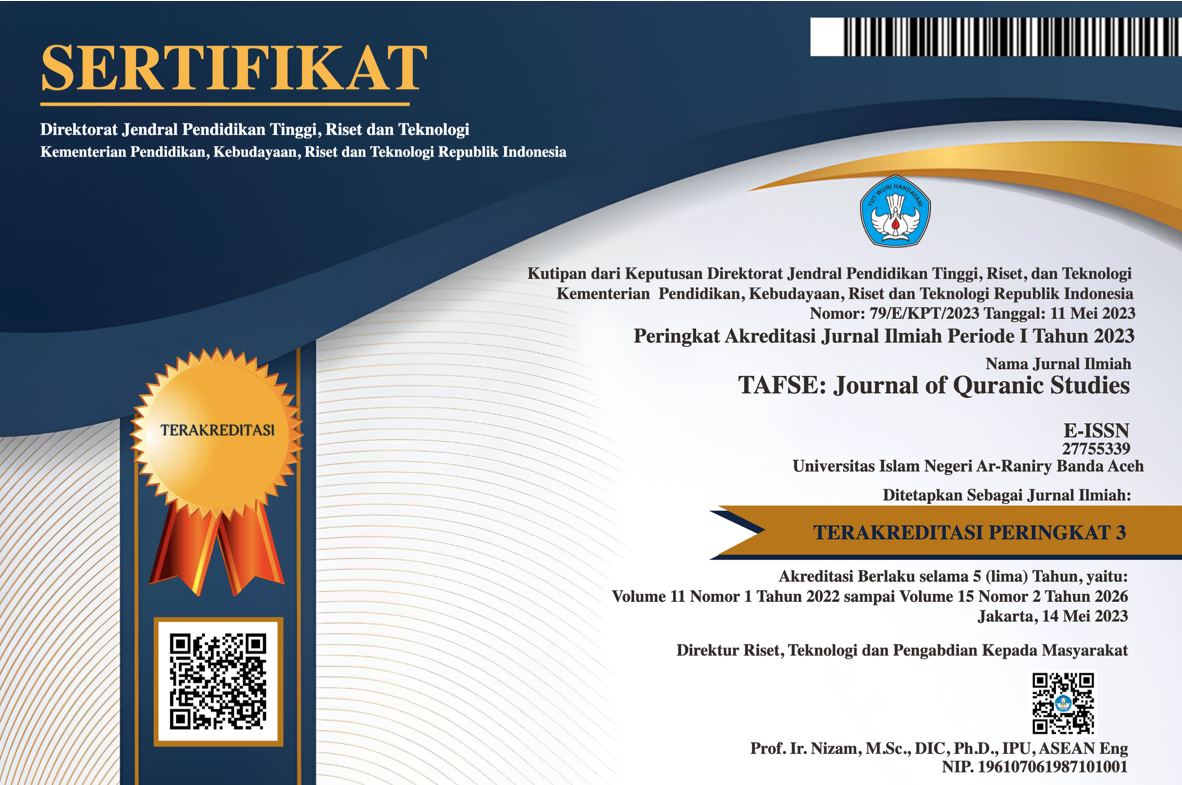Konsep Mahabbah dalam Al-Qur’an
DOI:
https://doi.org/10.22373/tafse.v3i2.13273Keywords:
Mahabbah, Maksiat, Al-Qur’anAbstract
Human love is nature from God. Mahabbah or love for fellow human beings in the form of love for parents, children, husband and wife and relatives is something that is natural, because of closeness and other emotional relationships. Moreover, love for them is based on love for Allah swt. However, all of this is forbidden if love for those closest to him turns him away from Allah, making him close his eyes in distinguishing between right and wrong. On the basis of this thought, it is necessary to study how to place the love of fellow human beings in accordance with the instructions of the Qur'an. The results of this paper indicate that love for fellow human beings both for parents, children, husband and wife and relatives in Islam is highly recommended, but if this love makes someone associate partners with Allah, commit immorality and disobey the Messenger of Allah, then love for fellow humans is not justified.
Rasa cinta yang dimiliki manusia merupakan suatu fitrah dari Allah. Maḥabbah atau cinta sesama manusia berupa cinta kepada orang tua, anak, suami istri dan sanak saudara sesuatu yang alami, karena kedekatan dan hubungan emosional lainnya. Apalagi cinta kepada mereka didasari pada cinta kepada Allah swt. Akan tetapi, semua itu dilarang jika dengan cinta kepada orang-orang terdekat membuatnya berpaling dari Allah, membuat mata dia tertutup dalam membedakan antara yang benar dan yang salah. Atas dasar pemikiran inilah perlu dikaji bagaimana menempatkan cinta sesama manusia yang sesuai dengan petunjuk al-Qur’an. Hasil penulisan ini menunjukkan bahwa cinta sesama manusia baik kepada orang tua, anak, suami istri maupun sanak saudara di dalam Islam sangat dianjurkan, namun apabila cinta ini membuat seseorang menyekutukan Alah, berbuat maksiat serta ingkar kepada Rasulullah, maka rasa cinta kepada sesama manusia tidak dibenarkan.
Downloads
References
Abdul Hadi. Di Bawah Naungan Cinta, Terj. AH. Ba’adillah. Jakarta: Pustaka Azzam, 2002.
Abdul Hamid Kisyik. Bimbingan Islam Untuk Mencapai Keluarga Sakinah, Cet. 8. Bandung: PT Pustaka Al-Mizan, 2003.
Abdulmalik Abdulkarim Amrullah. Tafsir Al-Azhar, Juz 21. Jakarta: Pustaka Panjimas, 1982.
Abdurrahman Saleh Abdullah. Teori-Teori Pendidikan Berdasarkan Al-Qur’an. Jakarta: Rineka Cipta, 2002.
Abu Bakar Jabir Al-Jazairi. Ensiklopedi Muslim, Cet. 1, Terj. Fadhil Bahri. Jakarta: Darul Falah, 2000.
Adi Junjunan Musthafa. Energi Cinta untuk Keluarga, Cet.1. Jakarta: Belanoor, 2009.
Al-Allamah Al-Sulami. Haqaiq al-Tafsir, http://www.altafsir.com/tafasir.
Al-Baidhawi. Anwar al-Tanzil wa Asrar al-Ta’wil, Jilid 2. Kairo: Harramayin, t.th.
Al-Imam Abul Husain Muslim bin Al-Hajjaj Al-Qusyairi Al-Naisaburi. Shahih Muslim. Beirut: Darul Kutub Al-Ilmiyyah, t.th.
Amru Khalid. Hati Sebening Mata Air, Terj. Imam Mukhtar. Solo: Aqwam, 2006.
Anton M. Muliono, dkk. Kamus Besar Bahasa Indonesia. Jakarta: Balai Pustaka, 1988.
Ibnu Qayyim al-Jauziyyah. Manajemen Qalbu: Melumpuhkan Senjata Syetan, Terj. Ainul Haris Umar Arifin Thayib. Jakarta: Dar al-Falah, 2005.
Imam Al-Syirazi, Al-Rais al-Bayan fῑ Haqāiq Alquran, http://www.altafsir.com/tafasir.
Kusmarwanti M. Idham. Smart Love: Jurus Jitu Mengelola Cinta. Jakarta: Gema Insani Press, 2007.
Muflih Kamil. Rahasia Pernikahan Bahagia, Terj. Butsainah Al-Sayyid Al-Iraqi. Jakarta: Griya Ilmu: 2006.
Muhammad Hasbi Ash-Shiddieqy. Tafsir Alquran Majid al-Nur, jilid 3. Semarang: Pustaka Rizki Putra, 2000.
Muhammad Majdi Marjan. Muhammad Nabi Cinta, Terj. Subhan Nur. Depok: Pustaka Iman, 2006.
Muhsin Labib. Indahnya Rumah Tangga Sakinah. Surabaya: Putra Jaya, 2007.
Nur Faizin Muhith. Menguak Rahasia Cinta dalam Alquran. Jakarta: Indiva Media Kreasi, 2008.
Siti Muslikhati. Feminisme dan Pemberdayaan Perempuan dalam Timbangan Islam. Jakarta: Gema Insani, 2004.
Udik Abdullah. Smart Love: Kiat Mempertautkan Hati Sesama Muslim, Cet. 1. Jakarta: Zikrul Hakim, 2005.
Downloads
Published
Issue
Section
License
Authors who publish with this journal agree to the following terms:
- Authors retain copyright and grant the journal right of first publication with the work simultaneously licensed under a Creative Commons Attribution License (CC BY NC 4.0) that allows others to share the work with an acknowledgment of the work's authorship and initial publication in this journal.
- Authors are able to enter into separate, additional contractual arrangements for the non-exclusive distribution of the journal's published version of the work (e.g., post it to an institutional repository or publish it in a book), with an acknowledgment of its initial publication in this journal.
- Authors are permitted and encouraged to post their work online (e.g., in institutional repositories or on their website) prior to and during the submission process, as it can lead to productive exchanges, as well as earlier and greater citation of published work (See The Effect of Open Access).





